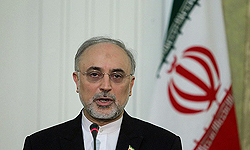

Iran’s foreign minister underlined the importance of mediation efforts to arrange talks between the Syrian government and opposition, and stressed Iran’s ability to mediate such talks, reminding that Tehran has been in contact with many Syrian dissidents even before the recent developments in the country.
“The Islamic Republic of Iran has been in contact with an extensive part of the (Syrian) opposition since before (the recent unrests) and has always tried to pave the ground for talks between the Syrian government and its opponents,” Iranian Foreign Minister Ali Akbar Salehi said at a joint press conference with his Turkmen counterpart Rasit Meredow in Tehran on Monday.
“We, for our turn, have announced that we are ready to facilitate arrangement of talks between the Syrian Republic’s government and the opposition,” he added.
He called on the regional countries and those interested in the establishment of peace, stability and security in the region to cooperate for the settlement of the Syrian crisis and find a way of securing the interests of the Syrian people, the region and the international community.
Yesterday, Salehi also announced Tehran’s readiness to hold meetings with the Syrian dissidents in a move to facilitate talks between the opposing parties in the Muslim country.
“The Islamic Republic of Iran is ready to have meetings with Syrian dissidents to invite them to Iran in a bid to prepare and facilitate the ground for talks between the Syrian dissidents and government,” Salehi told reporters in Tehran on Sunday.
Stressing the importance of finding a Syrian solution to the crisis in the Arab country, he said no foreign prescription and government should be imposed on the Syrians.
Salehi expressed the hope that the problems in Syria would be resolved through cooperation among the regional states, and said, “We hope that such cooperation will be extended through cooperation among Iran, the UN and certain regional states and an effective step will be taken to solve Syria’s problem.”
Tehran has repeatedly offered to help resolve the crisis, but this has been opposed by the US and its allies which support rebel and terrorist groups in the country. At the insistence of the US, Iran was left off the guest list of Annan’s multinational “action group” meeting on Syria in Geneva late last month, where the participating nations approved a communiqué outlining broad parameters for a “transitional” government.
Last week, UN-Arab league envoy Kofi Annan was in Tehran in a visit which signaled Iran’s key role in resolving the Syrian crisis. The former UN chief tried to rescue his peace plan for Syria by seeking help from Iran.
Prior to his Tehran visit, Annan said despite Washington’s harsh rhetoric, Iran is a main actor in the Syrian issue that “cannot be ignored”.
Annan told France’s Le Monde daily that Iran should be involved in discussions.
“Russia wields influence but I am not sure that the events will be determined by Russia alone…. Iran is an actor. It has to be part of the solution. It has influence and we cannot ignore it.”
Analysts believe that Annan’s visit may signal some new role for Iran in resolving the Syrian crisis.
In a statement, Annan said he had come to Iran “to see how we can work together to help settle the situation in Syria”.
The trip suggests that Annan is eager to have Tehran on board for any possible peace deal or transitional governing plan that may emerge for Syria. He has said repeatedly that Iran is an important regional power and should be involved in a resolution of the Syrian crisis.
Annan also expressed irritation that while Russia and Iran were mentioned by some as stumbling blocks to peace, “little is said about other countries which send arms, money, and have a presence on the ground.”
The US daily, Washington Post, reported in May that the Syrian rebels and terrorist groups battling the President Bashar al-Assad’s government have received significantly more and better weapons in recent weeks, a crime paid for by the Persian Gulf Arab states and coordinated by the United States.
The newspaper, quoting opposition activists and US and foreign officials, reported that Obama administration officials emphasized the administration has expanded contacts with opposition military forces to provide the Persian Gulf nations with assessments of rebel credibility and command-and-control infrastructure.
According to the report, material is being stockpiled in Damascus, in Idlib near the Turkish border and in Zabadani on the Lebanese border.
Opposition activists who three months ago said the rebels were running out of ammunition said in May that the flow of weapons – most bought on the black market in neighboring countries or from elements of the Syrian military in the past – has significantly increased after a decision by Saudi Arabia, Qatar and other Persian Gulf states to provide millions of dollars in funding each month.







